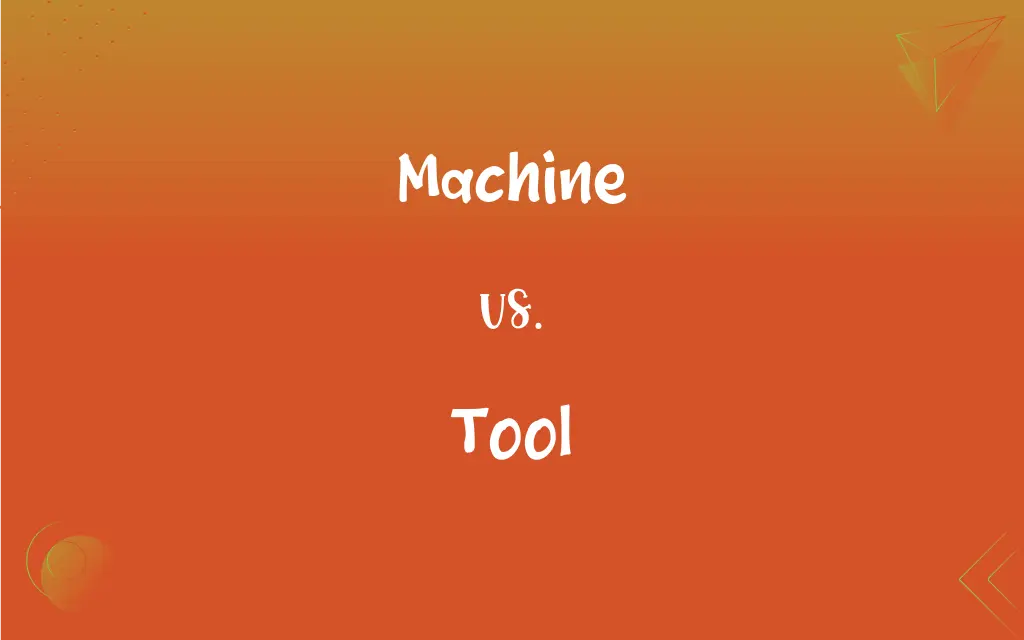Machine vs. Tool: What's the Difference?
Edited by Aimie Carlson || By Janet White || Updated on November 12, 2023
A machine is a complex device performing specific tasks, often powered and automated, whereas a tool is a simpler instrument usually operated manually for performing tasks.

Key Differences
Machines are typically complex assemblies using power and automation to perform specific tasks, such as a car engine or a computer. Tools, in contrast, are simpler instruments, often handheld, used to carry out a particular function, like a hammer or screwdriver. Machines usually involve multiple moving parts and systems, whereas tools are generally more straightforward in design and function.
The operation of machines often requires a power source, like electricity or fuel, enabling them to perform tasks independently or with minimal human intervention. Tools, however, are predominantly manual, relying on human effort and skill for their use. This distinction highlights machines as more autonomous, while tools are extensions of human capability.
In terms of complexity, machines often combine various mechanical, electrical, or digital components. Tools are typically singular objects, crafted for a specific purpose, such as cutting, drilling, or fastening. The complexity of machines often necessitates specialized knowledge or training for operation, whereas tools are generally more accessible and user-friendly.
Maintenance and repair of machines can be intricate, requiring specialized skills and often regular servicing. Tools are usually simpler to maintain and repair, with many able to last a lifetime with basic care. Machines, due to their complexity, are more prone to wear and malfunction than basic tools.
The evolution of machines has significantly impacted industries and societies, automating and optimizing various tasks. Tools, while also essential in technological and societal development, have remained more constant in their basic forms and functions, serving as fundamental aids in various crafts and trades.
ADVERTISEMENT
Comparison Chart
Complexity
Often complex with multiple components
Generally simpler, often single-component
Power Source
Usually requires external power (electric, fuel)
Operated manually without external power
Autonomy
Can operate independently or semi-independently
Requires human operation
Maintenance
Often requires specialized maintenance
Simpler maintenance, often user-serviceable
Evolution
Rapid technological advancements
Consistent in form and function over time
ADVERTISEMENT
Machine and Tool Definitions
Machine
It's an assembly of parts that work together to perform a specific function.
The printing press is a complex machine essential in the publishing industry.
Tool
A tool is a handheld device used to perform a specific task.
A carpenter uses a hammer as a tool for driving nails.
Machine
Machines often incorporate electronic systems for operation and control.
Modern cars are machines with advanced computer systems for navigation and safety.
Tool
It's a simple instrument used in manual operations or crafts.
The sculptor carefully used his chisel, an essential tool in his artistry.
Machine
Machines can be automated to operate independently.
Robotics are machines that perform tasks in manufacturing with precision and speed.
Tool
Tools are extensions of human skills in various crafts and professions.
For a painter, a brush is an indispensable tool for creating art.
Machine
A machine is a device that performs tasks using mechanical power.
The washing machine automatically cleans clothes with minimal human input.
Tool
A device operated by human effort to achieve a specific result.
The gardener used a shovel, a basic tool for digging.
Machine
A device that utilizes energy to accomplish a particular task.
The factory is full of machines designed for mass production.
Tool
Tools often aid in tasks like cutting, shaping, or assembling.
A wrench is a common tool for tightening or loosening bolts.
Machine
A device consisting of fixed and moving parts that redirects mechanical energy to accomplish a particular task or set of tasks.
Tool
A device, such as a saw, shovel, or drill, used to perform or facilitate manual or mechanical work.
Machine
See simple machine.
Tool
A machine, such as a lathe, used to cut and shape machine parts or other objects.
Machine
See compound machine.
Tool
The cutting part of such a machine.
FAQs
What is a tool?
A tool is a handheld device used for performing specific manual tasks.
Are tools always manual?
Generally, yes, tools are predominantly operated by human effort.
What are common examples of tools?
Hammers, screwdrivers, and saws are common examples of tools.
Do machines require maintenance?
Yes, machines often require regular maintenance and servicing.
Are tools used in all professions?
Most professions use some form of tools, whether simple or specialized.
How do machines impact industries?
Machines automate and optimize production, increasing efficiency and output.
Can tools be electronic?
Some modern tools incorporate electronic components but are primarily manual.
Can machines operate without human intervention?
Many machines are designed to operate automatically or with minimal human input.
Can a machine be a tool?
While machines can serve tool-like functions, they are typically more complex.
Is a computer a machine?
Yes, a computer is a type of machine with digital processing capabilities.
What is a machine?
A machine is a device using mechanical power to perform specific tasks.
How have machines evolved over time?
Machines have become more sophisticated, incorporating electronic and digital technology.
Are machines always larger than tools?
Not necessarily, but machines are generally more complex regardless of size.
What role do machines play in daily life?
Machines play a significant role in various aspects of daily life, from household chores to transportation.
Do machines replace human workers?
In some industries, machines automate tasks previously done by humans.
Are tools evolving technologically?
While tools maintain their basic functions, some have evolved with technological enhancements.
How do tools enhance human capabilities?
Tools extend human physical capabilities, allowing for more precise and efficient work.
How do tools contribute to craftsmanship?
Tools are essential for precision and skill in various crafts and trades.
What is the importance of machine maintenance?
Proper maintenance ensures machines operate efficiently and safely.
Can machines be part of larger systems?
Yes, machines can be components of larger, more complex systems.
About Author
Written by
Janet WhiteJanet White has been an esteemed writer and blogger for Difference Wiki. Holding a Master's degree in Science and Medical Journalism from the prestigious Boston University, she has consistently demonstrated her expertise and passion for her field. When she's not immersed in her work, Janet relishes her time exercising, delving into a good book, and cherishing moments with friends and family.
Edited by
Aimie CarlsonAimie Carlson, holding a master's degree in English literature, is a fervent English language enthusiast. She lends her writing talents to Difference Wiki, a prominent website that specializes in comparisons, offering readers insightful analyses that both captivate and inform.































































